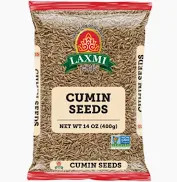Product Overview
Cumin Seeds.
Cumin is the seed of a small umbelliferous plant. The seeds come as paired or separate carpels, and are 3-6mm (1/8-1/4 in) long. They have a striped pattern of nine ridges and oil canals, and are hairy, brownish in colour, boat-shaped, tapering at each extremity, with tiny stalks attached.
Bouquet: Strong, heavy and warm. A spicy-sweet aroma.
Flavour: Pungent, powerful, sharp and slightly bitter.
Culinary Uses: Cumin is used mainly where highly spiced foods are preferred. It features in Indian, Eastern, Middle Eastern, Mexican, Portuguese and Spanish cookery.
It is an ingredient of most curry powders and many savoury spice mixtures, and is used in stews, grills - especially lamb - and chicken dishes. It gives bite to plain rice, and to beans and cakes. Small amounts can be usefully used in aubergine and kidney bean dishes. Cumin is essential in spicy Mexican foods such as chile con carne, casseroled pork and enchiladas with chili sauce.
Medicinal Uses: Cumin is stomachic, diuretic, carminative, stimulant, astringent, emmenagogic and antispasmodic. It is valuable in dyspepsia diarrhoea and hoarseness, and may relieve flatulence and colic. In the West, it is now used mainly in veterinary medicine, as a carminative, but it remains a traditional herbal remedy in the East. It is supposed to increase lactation and reduce nausea in pregnancy. It has been shown to be effective in treating carpal tunnel syndrome, as well as diarrhea, indigestion, and morning sickness.
Cumin also shows promise as a natural way to increase breast size. Used in a poultice, it relieves swelling of the breast or the testicles. Cumin stimulates the appetite.




